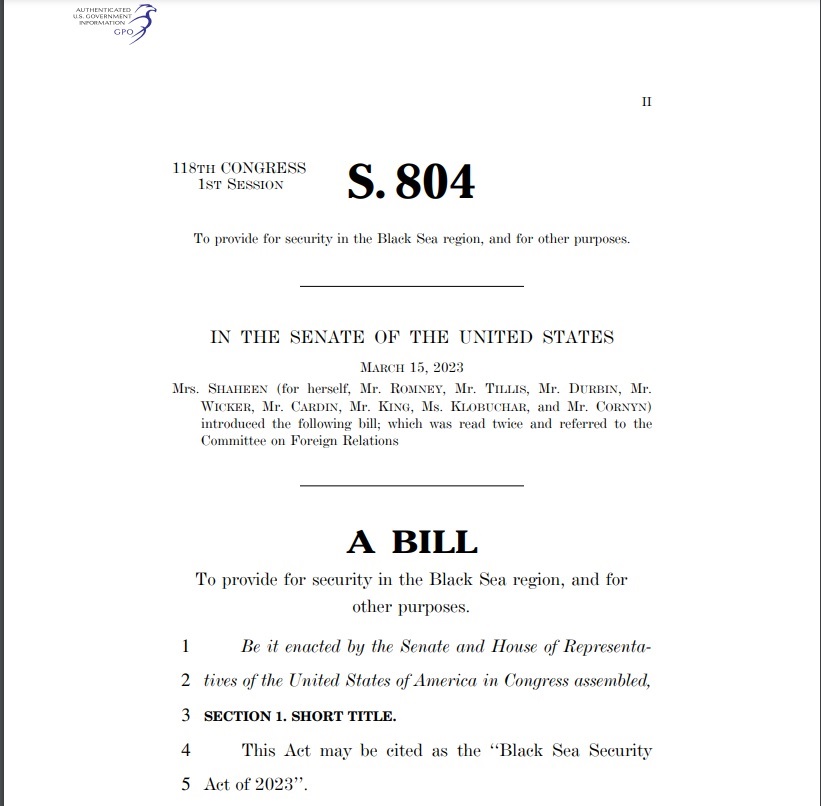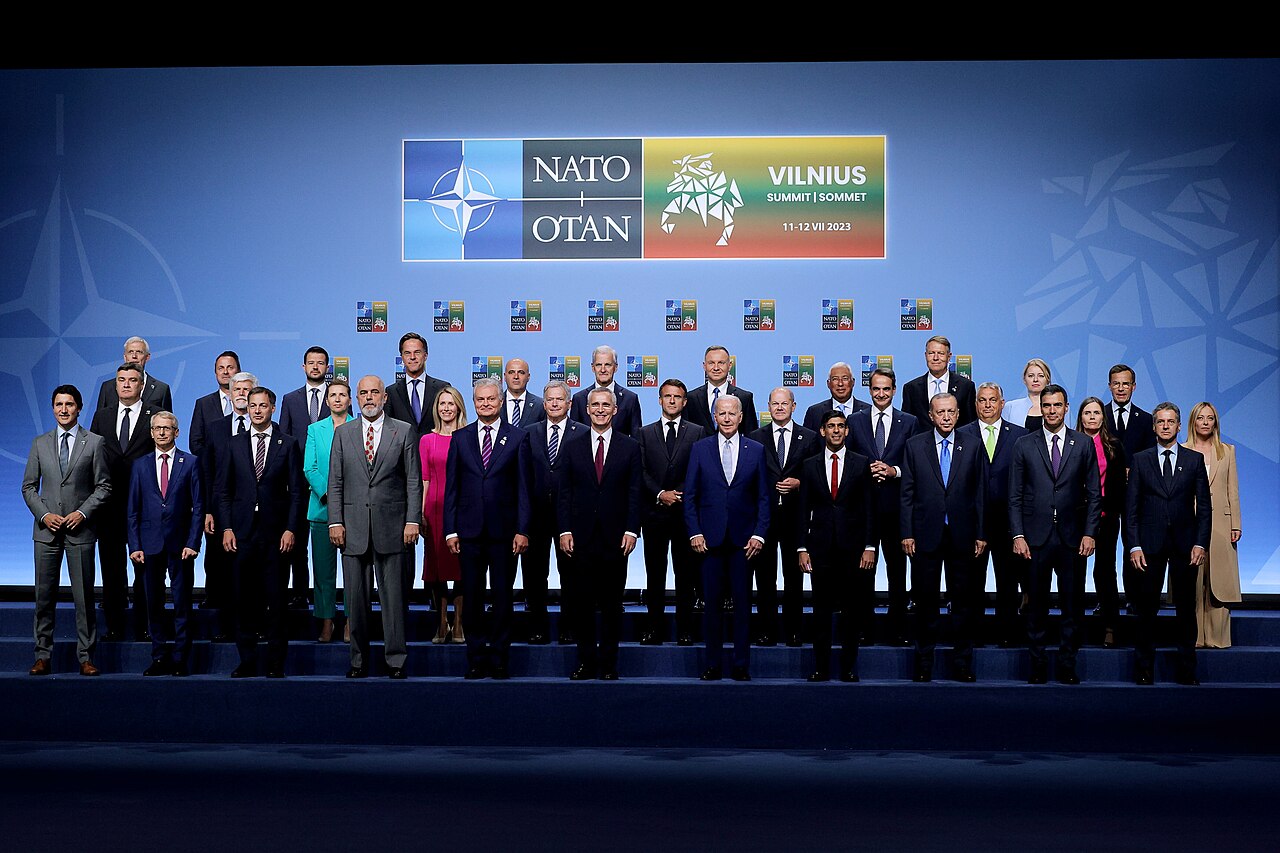
“What happens in the Black Sea does not stay there.” This is what the U.S. Senator Jeanne Shaheen (D-NH) - a senior member of the U.S. Senate Foreign Relations Committee (SFRC) and Chair of the Europe and Regional Security Cooperation Subcommittee - said at a hearing of the Subcommittee on Europe and Regional Security Cooperation on the Department of State’s strategy for security in the Black Sea Region on 25 October. Mrs. Shaheen’s interpretation of the Black Sea region illustrates the rapidly emerging perception about the centrality of the region in the framework of the global great power competition between the US and its adversaries, namely, Russia and China. Senator Pete Ricketts’ (R-NE) identification of the Black Sea at the same hearing as a region that is becoming “the gravitational center for Europe’s future and “yet another important theater in the great power competition between Russia, us [the US], and the People's Republic of China” is also a good recap of the outlook that outlines the US Black Sea strategy. The bottom line is that the US picks out the Black Sea region as a key front in Cold War 2.0. It is because of this outlook that while the US policymaking circles are focusing on strategizing about the Black Sea like never before, the mainstream Western think tanks are intensively publishing op-eds and reports on the region.
The Black Sea Security Act of 2023
Within this context, the Black Sea Security Act of 2023 (first introduced in July 2022; amended; passed two chambers) that currently awaits the signature of President Biden as an addition to the National Defense Authorization Act (NDAA) is an important document that reveals the US’ Black Sea strategy.
The document identifies the Black Sea region “as an arena of Russian aggression” that needs to be countered. Reference to the Russian aim to “control access to the Mediterranean Sea through the Black Sea” points out the wider geostrategic importance of the region. Likewise, the identification of the objective of “countering the PRC's coercive economic pursuits” as an “important policy imperative in order to further integrate the Black Sea states into western economies and improve regional stability” is another glimmer of the same importance. It is noteworthy that the Act foresees the accelerated “advancement of the Black Sea countries into the Euroatlantic community.”
Underlining the geostrategic importance of the Black Sea, the Act recommends US actions pertaining to security, economic prosperity, democratic resilience, and regional connectivity. Concerning security, the Act stipulates increased US security assistance toward Black Sea states focused on Ukraine, Romania, Bulgaria, Moldova, and Georgia. It recommends to asses “the challenges and opportunities of establishing a regular, rotational NATO maritime presence in the Black Sea, including an analysis of the capacity, capabilities, and commitment of NATO members to create this type of mission.” On the economic front, the Act urges the US to have a poignant economic presence in the region. It identifies energy diversification and replacing supplies from Russia as a critical step in this direction. Measures for the democratic resilience of the regional states such as support for US-supported media initiatives, and more frequent visits of US officials to the region are also among the recommendations. An important aspect of the Act is its sanctioning of US-NATO-EU tandem in the Black Sea.
In line with the Black Sea Security Act of 2023, the Assistant Secretary of State for European and Eurasian Affairs James O'Brien in his statement to the aforementioned hearing underlined three reasons why the Black Sea region is a geostrategically important region for the US. These three reasons that O'Brien mentioned are 1) the NATO allies and partners; 2) the status of the Black Sea as a “vital corridor for the movement of goods;” and 3) “the untapped energy resources.” O’Brien identified five main areas of action to pursue the US strategy, which are: 1) “political and diplomatic engagement with the region – both bilaterally and in multilateral;” 2) strengthening US’ regional security cooperation by supporting a strong NATO presence in the region, ensuring US security assistance to supports the region's defense modernization needs, and defending freedom of navigation; 3) enhancing “regional economic cooperation to build resilience to Russian and PRC malign influence and promote a level playing field for business” by supporting “strategic infrastructure investments, strengthen investment screening, and advocate for transparency in public procurement;” 4) “promoting energy security and clean energy in the Black Sea region” by diversifying the region’s energy suppliers, increasing regional interconnections, and expanding clean energy solutions;” and 5) fostering “democratic resilience, with a focus on combating corruption and countering disinformation.”
Black Sea as a Theater of Great Power Competition
What can be seen is that the US’ Black Sea strategy is composed of two elements. The first and most obvious one is effacing the economic, political, and military potency of Russia by containing it in all spheres. The enthusiasm and political will of the post-communist states to integrate with the Euroatlantic is an obvious major advantage of the US to pursue this policy. However, economy and security-related dynamics and concerns are the factors that becloud American prospects. Russia is still a significant economic and trade partner of the Black Sea countries. In this regard, it is salient that from 2014 until the start of the Russia-Ukraine war in February 2022, the two countries continued their economic and trade relations uninterruptedly. Cutting economic ties with Russia would be quite costly for the regional countries that would require compensation from the US and the EU. Whether the US and its European allies have the necessary resources (and, of course, will) to economically support the Black Sea countries remains an open question. Hence, it is easier said than done to isolate Russia in the region economically. The fact that the Russian economy has not collapsed as a result of unprecedented sanctions as expected by Western analysts and that Russia was able to find ways to compensate its economic losses at least in the short term through trade with the countries of the non-western world demonstrates that western economic pressure on Russia is not efficacious enough to bring all the desired results.
Secondly, containing Russia militarily, particularly the attempts to contain it in the Black Sea to cut its supply routes to the Mediterranean Sea, may stir up a more aggressive Russia that is more reckless to engage in risky military adventures. This would result in further security challenges to small states of the region such as Moldova. In this regard, again the critical question would be the resolve of the US and its European allies to engage militarily with Russia in theaters other than Ukraine. This is an even more important question given the discussions on war fatigue in the West.
The second and less outward and long-term element of the US’ Black Sea strategy is blocking China from making inroads into the region. As to that, Senator Ricketts’ warning on 25 October that China should play no role in the post-war reconstruction of Ukraine is a remark pointing out long-term projections of the US.
From a wider perspective, obscuring Chinese influence in the Black Sea region is a more challenging objective than the objective of isolating Russia. The flirtation between EU-aspirant Georgia and China, and the ongoing talks between the two on the Anaklia deep sea port as a big critical infrastructure project is an obvious example in this regard. The point is that, the prospect of elimination of Russia as a transport corridor between the Pacific and Atlantic and the Chinese interest in supporting the Middle Corridor within the framework of the Belt and Road Initiative as an alternative to the Russian route promise the Black Sea countries with significant economic and strategic benefits. Therefore, the US and its European allies need to find ways to offer profitable alternatives to the BRI-related Chinese infrastructure projects. As to that, the Build Back Better World (B3W) initiative (G7’s alternative to the BRI) and EU’s Global Gateway strategy are two curious perspectives worth watching out for. Senator Shaheen’s recognition of the Black Sea region as an economic connector and Assistant Secretary O’Brien’s advocacy of connecting the Black Sea with world markets at the 25 October hearing were important remarks from this perspective, as well.
In any case, the matter of regional and global connectivity infrastructure projects will remain a highly relevant issue for the region in the coming years. Related to that, the issue of the East-West energy corridors connecting Central Asia with Europe will be another critical factor. Within this framework, the EU’s approach to relations with China and the question of whether the EU will follow the American lead like it did in the Ukrainian case or it will follow a more Europe-centered autonomous policy is an important one. For now, it can be seen that the EU is still yet to formulate a solid China strategy. Nevertheless, the economic costs of choices with respect to the Russia-Ukraine war may direct some European policymakers to have second thoughts about unconditionally following the US lead vis-à-vis China.
To sum up, it is by now clear that the once relatively cast-off region of the Black Sea has moved to a central place in the global great power competition. What is salient in the new picture is that, whereas Russia has always been the central factor in US geopolitical thinking about the Black Sea, now China is also a factor, even a more important one, in strategic calculations. The elevation of the status of the Black Sea region in the global geopolitical arena engenders advantages and risks to regional states. In fact, the stakes are quite high not just for the ‘great powers’ but also for the Black Sea countries. Obviously, the countries that read the developments more realistically will have certain advantages in fostering their national interests.
*This article will be followed by another on the place of Türkiye in the US’ Black Sea strategy.
© 2009-2025 Center for Eurasian Studies (AVİM) All Rights Reserved
No comments yet.
-
THERE MAY BE HOPE: LET’S BE OPTIMISTIC ABOUT THE RESOLUTION OF THE TURKISH-ARMENIAN CONTROVERSY
Turgut Kerem TUNCEL 24.02.2016 -
 ARMEN SARKISSIAN’S PRESIDENCY AND THE QUESTIONS ON ETHICS AND POLITICAL CULTURE IN ARMENIA (26.01.2022)
ARMEN SARKISSIAN’S PRESIDENCY AND THE QUESTIONS ON ETHICS AND POLITICAL CULTURE IN ARMENIA (26.01.2022)
Turgut Kerem TUNCEL 26.01.2022 -
 KYRGYZSTAN AFTER 10 JANUARY 2021 PRESIDENTIAL ELECTIONS AND CONSTITUTIONAL REFERENDUM
KYRGYZSTAN AFTER 10 JANUARY 2021 PRESIDENTIAL ELECTIONS AND CONSTITUTIONAL REFERENDUM
Turgut Kerem TUNCEL 21.01.2021 -
 THE 2023 NATO SUMMIT AND THE BLACK SEA SECURITY
THE 2023 NATO SUMMIT AND THE BLACK SEA SECURITY
Turgut Kerem TUNCEL 20.07.2023 -
 THE POLITICAL GAMBIT OF SERZH SARGSYAN
THE POLITICAL GAMBIT OF SERZH SARGSYAN
Turgut Kerem TUNCEL 10.04.2018
-
TURKIC COUNCIL AND EURASIAN COOPERATION IN THE LIGHT OF DEVELOPMENTS IN THE REGION
Özge Nur ÖĞÜTCÜ 24.02.2015 -
 WHY IS GERMANY INCREASING ITS ARMAMENT CAPACITY?
WHY IS GERMANY INCREASING ITS ARMAMENT CAPACITY?
Şevval Beste GÖKÇELİK 29.03.2022 -
 US: RUSSIA ORCHESTRATING UKRAINE VIOLENCE
US: RUSSIA ORCHESTRATING UKRAINE VIOLENCE
Hande Apakan 13.04.2014 -
THE RESOLUTION OF THE SWEDISH PARLIAMENT
Ömer Engin LÜTEM 11.03.2010 -
 REFUGEE CRISIS IN EUROPE AND BALKANS
REFUGEE CRISIS IN EUROPE AND BALKANS
Ekin GÜNAYSU 16.11.2015
-
25.01.2016
THE ARMENIAN QUESTION - BASIC KNOWLEDGE AND DOCUMENTATION -
12.06.2024
THE TRUTH WILL OUT -
27.03.2023
RADİKAL ERMENİ UNSURLARCA GERÇEKLEŞTİRİLEN MEZALİMLER VE VANDALİZM -
17.03.2023
PATRIOTISM PERVERTED -
23.02.2023
MEN ARE LIKE THAT -
03.02.2023
BAKÜ-TİFLİS-CEYHAN BORU HATTININ YAŞANAN TARİHİ -
16.12.2022
INTERNATIONAL SCHOLARS ON THE EVENTS OF 1915 -
07.12.2022
FAKE PHOTOS AND THE ARMENIAN PROPAGANDA -
07.12.2022
ERMENİ PROPAGANDASI VE SAHTE RESİMLER -
01.01.2022
A Letter From Japan - Strategically Mum: The Silence of the Armenians -
01.01.2022
Japonya'dan Bir Mektup - Stratejik Suskunluk: Ermenilerin Sessizliği -
03.06.2020
Anastas Mikoyan: Confessions of an Armenian Bolshevik -
08.04.2020
Sovyet Sonrası Ukrayna’da Devlet, Toplum ve Siyaset - Değişen Dinamikler, Dönüşen Kimlikler -
12.06.2018
Ermeni Sorunuyla İlgili İngiliz Belgeleri (1912-1923) - British Documents on Armenian Question (1912-1923) -
02.12.2016
Turkish-Russian Academics: A Historical Study on the Caucasus -
01.07.2016
Gürcistan'daki Müslüman Topluluklar: Azınlık Hakları, Kimlik, Siyaset -
10.03.2016
Armenian Diaspora: Diaspora, State and the Imagination of the Republic of Armenia -
24.01.2016
ERMENİ SORUNU - TEMEL BİLGİ VE BELGELER (2. BASKI)
-
AVİM Conference Hall 24.01.2023
CONFERENCE TITLED “HUNGARY’S PERSPECTIVES ON THE TURKIC WORLD"









